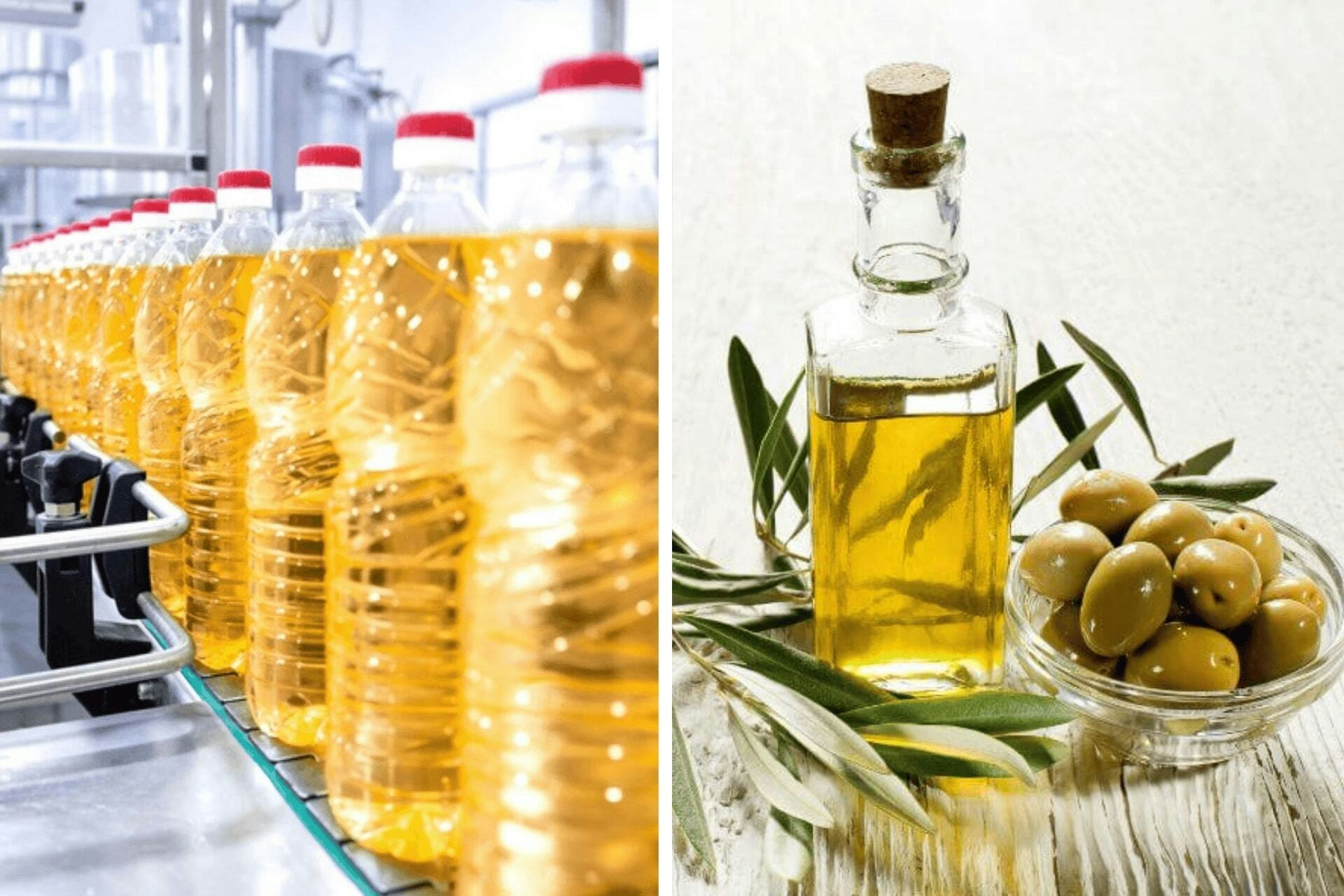Olive oil has long been a go-to in kitchens around the world, loved for its flavor and health benefits. But depending on what you’re cooking — or your personal dietary needs — there are times when another oil might be a better fit.
Some oils can handle higher heat, others bring a unique flavor, and a few offer different nutritional advantages. In this article, we’ll explore seven healthy olive oil substitutes and explain when each one works best.
The Best Olive Oil Substitutes
Different recipes and health needs sometimes call for a different oil. The good news is, these seven healthy options can easily step in and do the job:
1. Algae Cooking Oil - Best Olive Oil Substitute
If you’re looking for one oil that checks all the boxes — high heat cooking, neutral flavor, heart health, and allergy safety — algae cooking oil is it. With the highest smoke point of 535°F, it’s ideal for searing in stainless steel pans, deep frying, or any other high-heat cooking method.
It’s also made from microalgae, making it allergy-friendly and plant-based. Plus, it’s packed with omega-9s, which support heart health ❶. If you want a dependable oil that performs well and supports your wellness goals, this is the top pick.
Related: Health Benefits of Algae Oil
2. Avocado Oil
Avocado oil is made by pressing the flesh of ripe avocados. It’s rich in monounsaturated fats, the same heart-healthy fats found in olive oil, and contains antioxidants like vitamin E. It has a mild, slightly buttery flavor and a beautiful greenish-gold color.
Refined avocado oil is incredibly versatile, making it a reliable substitute in many recipes that call for olive oil. It works especially well in salad dressings, sautéed vegetables, and grilled dishes. Thanks to its high smoke point (around 480-520°F), it’s also safe for roasting and pan-searing, unlike olive oil, which can break down at high temperatures.
Related: Avocado Oil Substitutes
3. Grapeseed Oil
Grapeseed oil is extracted from the seeds of grapes, often as a byproduct of winemaking. It’s a great olive oil alternative when you want a milder flavor, especially in stir-fries, baked goods, or homemade mayonnaise and marinades.
Its smoke point of about 421°F also makes it suitable for medium- to high-heat cooking, like sautéing and roasting.
Grapeseed oil also contains vitamin E and is rich in polyunsaturated fats, particularly omega-6 fatty acids, which are beneficial in moderation, especially when balanced with enough omega-3s in the diet.
Related: Grapeseed Oil Substitutes
4. Canola Oil
Canola oil is made from the seeds of the canola plant, a variety of rapeseed developed to be low in harmful compounds. It has a smooth texture and is lower in saturated fat than olive oil, with about 7g of saturated fat per 100g, compared to 14g in olive oil ❷❸.
Canola oil is a great swap for olive oil in high-heat cooking like roasting, pan-searing, or stir-frying, thanks to its smoke point of around 428-446°F. It’s also ideal for recipes that call for a neutral flavor, such as baking, dressings, and marinades.
Related: Canola Oil Substitutes
5. Sunflower Oil
Sunflower oil is made by pressing the seeds of the sunflower plant. It’s light in color, has a neutral flavor, and is naturally free from common allergens like nuts and soy.
Nutritionally, it’s high in vitamin E and low in saturated fat, depending on the type (high-oleic sunflower oil is the healthiest version and more stable for cooking). With a smoke point of around 450°F, refined sunflower oil is more stable than olive oil at high temperatures and won’t burn as easily.
Related: Sunflower Oil Substitutes
6. Walnut Oil
Walnut oil is pressed from whole walnuts and has a rich, nutty flavor that adds depth to many dishes. It’s high in omega-3 fatty acids, especially alpha-linolenic acid (ALA), which supports heart and brain health. Like olive oil, it also contains antioxidants and polyphenols that help reduce inflammation.
Unrefined walnut oil is best used in cold or low-heat dishes. Use it for salad dressings, grain bowls, steamed vegetables, or add it to dips like hummus. Since it has a low smoke point (around 320°F), it’s not recommended for frying or high-heat cooking.
7. Peanut Oil
Peanut oil is extracted from peanuts using either cold-pressing or refining methods. Refined peanut oil is the most common type used for cooking and is typically free of peanut proteins, making it less likely to cause allergic reactions — but it’s still best avoided by those with peanut allergies, just to be safe.
Thanks to its high smoke point of about 450°F, peanut oil is an excellent olive oil substitute in deep-frying, stir-frying, and high-heat searing. For instance, if you’re preparing crispy vegetable stir-fry or fried chicken, peanut oil holds up better under heat than olive oil.
Refined peanut oil is a smart choice when you need a stable, light-flavored oil — especially for high-heat or Asian-style cooking.
Related: Peanut Oil Substitutes
How to Choose the Right Olive Oil Substitute
Not all oils work the same way, so choosing the right substitute depends on what you're cooking and what matters most to you, whether that's flavor, health benefits, or how well the oil handles heat.
Here are a few key things to consider before making your swap:
Cooking method
If you’re frying, roasting, or grilling, choose an oil with a high smoke point like algae cooking oil, avocado oil, or peanut oil. This will ensure that the oil doesn’t break down or produce harmful compounds at high temperatures — and helps your food cook evenly with better flavor and texture.
Flavor profile
Some oils are neutral (like canola or sunflower), while others have a distinct taste (like walnut or peanut oil). If you want the oil to blend in and let other ingredients shine, go with a mild-flavored option. But if you’re looking to add a layer of flavor, a nutty or buttery oil can make the dish even better.
Health benefits
All of the oils listed here offer different nutritional profiles. If your goal is to reduce saturated fat, canola oil has about half as much as olive oil. Algae cooking oil is another great pick. Also consider food allergies — algae cooking oil is typically allergy-friendly, while peanut oil should be avoided by those with peanut sensitivities.
The Bottom Line
Olive oil is a kitchen staple for a reason, but it’s not your only option. From nutty walnut oil for dressings to high-performance options like avocado and peanut oil, these substitutes can help you cook with confidence and variety.
If you're looking for one substitute that checks every box: neutral flavor, ultra-high smoke point, allergy-safe, and rich in heart-healthy fats, algae cooking oil from Algae Cooking Club is one of the most well-rounded choices available. It's the kind of oil you can count on for just about anything in the kitchen.
FAQs About Olive Oil Substitutes
What is the best substitute for olive oil?
The best substitute depends on how you’re using it. For high-heat cooking like frying or roasting, avocado oil or algae cooking oil are excellent choices because of their high smoke points and heart-healthy fats. For raw uses like salad dressings or drizzling, walnut oil or grapeseed oil offers a light, pleasant flavor. If you’re avoiding allergens, algae cooking oil is a good option.
Can you substitute olive oil for vegetable oil?
Yes, you can generally substitute olive oil for vegetable oil in most recipes. The main thing to consider is flavor and heat tolerance. Olive oil has a stronger, more distinct taste that can change the flavor of baked goods or delicate dishes, whereas vegetable oil is usually neutral.
Can I use butter instead of olive oil?
Yes, in some recipes, butter can be used instead of olive oil — especially for baking, sautéing, or finishing a dish. Butter adds a rich flavor and creamy texture but contains more saturated fat and a lower smoke point, which makes it less suitable for high-heat cooking.
If you're watching cholesterol or trying to follow a heart-healthy diet, plant-based oils like olive, avocado, or algae cooking oil are generally better long-term choices.




